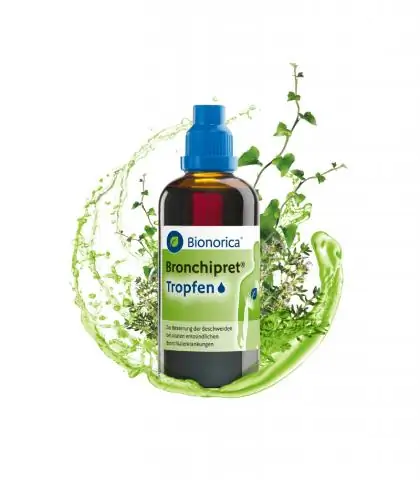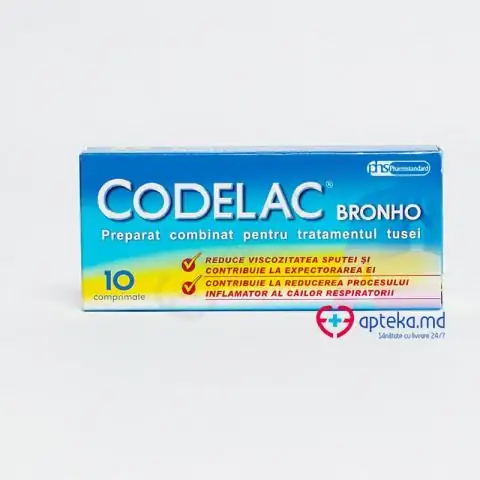- Author Rachel Wainwright wainwright@abchealthonline.com.
- Public 2023-12-15 07:39.
- Last modified 2025-11-02 20:14.
Asterisk Nose
Asterisk Noz: instructions for use and reviews
- 1. Release form and composition
- 2. Pharmacological properties
- 3. Indications for use
- 4. Contraindications
- 5. Method of application and dosage
- 6. Side effects
- 7. Overdose
- 8. Special instructions
- 9. Application during pregnancy and lactation
- 10. Use in childhood
- 11. Drug interactions
- 12. Analogs
- 13. Terms and conditions of storage
- 14. Terms of dispensing from pharmacies
- 15. Reviews
- 16. Price in pharmacies
Latin name: Zvezdochka NOZ
ATX code: R01AA07
Active ingredient: xylometazoline (xylometazoline)
Manufacturer: DANAPHA PHARMACEUTICAL, Joint Stock Company (Vietnam)
Description and photo updated: 22.11.2018
Prices in pharmacies: from 15 rubles.
Buy

Asterisk Noz is a vasoconstrictor drug for local use in ENT practice; decongestant drug.
Release form and composition
- nasal spray: colorless transparent solution (10, 15, 20 or 30 ml in a plastic bottle with a spray and a protective cap made of polyethylene, in a cardboard box 1 bottle);
- nasal drops: colorless transparent solution (10, 15 or 20 ml in a plastic dropper bottle with a plastic screw cap, 1 bottle in a cardboard box).
1 ml of spray contains:
- active substance: xylometazoline hydrochloride - 1 mg;
- additional components: disodium hydrogen phosphate dodecahydrate, disodium dihydrogen phosphate dihydrate, benzalkonium chloride, disodium edetate dihydrate, sodium chloride, purified water.
1 ml drops contain:
- active substance: xylometazoline hydrochloride - 0.5 or 1 mg;
- additional components: sodium hydrogen phosphate, benzalkonium chloride, sodium dihydrogen phosphate, sodium chloride, purified water.
Pharmacological properties
Pharmacodynamics
Xylometazoline hydrochloride, the active ingredient of the drug, is a vasoconstrictor (alpha-adrenomimetic). The agent, providing a narrowing of the blood vessels of the nasal mucosa, helps to eliminate its edema and hyperemia. Against the background of rhinitis, facilitates nasal breathing. The effect of the drug is noted a few minutes after administration and lasts for several hours.
Pharmacokinetics
When applied topically, the drug is practically not absorbed, its plasma concentrations are so insignificant that they cannot be determined by modern analytical methods.
Indications for use
- acute respiratory diseases with symptoms of rhinitis (symptomatic therapy), acute allergic rhinitis, sinusitis, hay fever;
- eustachitis (for spray), otitis media (in order to reduce swelling of the nasopharyngeal mucosa).
Also, the Asterisk Nose is used to prepare the patient for diagnostic manipulations in the nasal passages.
Contraindications
Absolute:
- atrophic rhinitis;
- severe atherosclerosis;
- tachycardia;
- arterial hypertension;
- glaucoma;
- conditions after transsphenoidal hypophysectomy (for spray);
- a history of indications of surgical interventions on the meninges;
- thyrotoxicosis;
- inflammatory lesions of the skin or mucous membrane of the vestibule of the nose (for spray);
- age up to 6 years;
- pregnancy;
- simultaneous use with monoamine oxidase inhibitors (MAO), tricyclic antidepressants, decongestants, drugs that increase blood pressure;
- hypersensitivity to any of the constituents of the drug.
Relative (use the Asterisk Nose with extreme caution):
- ischemic heart disease (angina pectoris III - IV functional class);
- pheochromocytoma (for spray);
- diabetes;
- hyperplasia of the prostate;
- lactation period;
- hypersensitivity to adrenergic drugs, accompanied by dizziness, arrhythmia, insomnia, increased blood pressure, tremor (for spray).
Instructions for use Asterisks Noz: method and dosage
Drops and spray Asterisk Nose are administered intranasally.
Recommended dosing regimen for children over 6 years old and adults:
- spray: 1 injection into each nasal passage 3 times a day;
- drops: 2-3 drops in each nasal passage 2-3 times a day.
Do not use the drug more than 3 times a day. Without consulting a doctor, the course of treatment should not be more than 7 days.
When injecting the spray, the bottle must be held with the spray upwards; after injection, a slight inhalation should be made through the nose.
Side effects
- digestive system: rarely - nausea, vomiting;
- nervous system: rarely - headache, insomnia, with prolonged use of high doses - depression; extremely rarely - paresthesia, for a spray - fatigue, anxiety, convulsions and hallucinations (mainly in children);
- cardiovascular system: rarely - palpitations, tachycardia, increased blood pressure; extremely rare - arrhythmias;
- organ of vision: rarely - visual impairment;
- respiratory system: often - hypersecretion, sneezing, dry nasal mucosa, tingling in the nose; infrequently - nosebleeds (for a spray), reactive hyperemia (increased swelling of the nasal mucosa);
- immune system: infrequently - hypersensitivity reactions;
- local reactions: often - burning at the injection site.
In the event of the occurrence of the above violations, it is required to stop using the Asterisk Nose and contact a specialist.
Overdose
Symptoms of accidental xylometazoline poisoning when taken orally may include: vomiting, nausea, mydriasis, fever, cyanosis, spasms, tachycardia, hypertension, cardiac arrhythmia, collapse, cardiac arrest, respiratory disturbances, pulmonary edema, suppression of central nervous system function (decreased body temperature,, hypotension, bradycardia, apnea, coma), mental disorders.
If these violations occur, gastric lavage is prescribed, activated carbon intake, in severe cases, artificial ventilation of the lungs is performed. If necessary, use anticonvulsant and antipyretic drugs. To lower blood pressure, phentolamine is slowly administered intravenously at a dose of 5 mg or taken orally at a dose of 100 mg. The use of vasopressor agents is contraindicated.
special instructions
Before carrying out the procedure, it is required to clear the nasal passages.
You should not use the drug for a long time and often against the background of chronic diseases of the nasopharynx.
It is recommended to make 2 test injections into the air before the introduction of the Asterisk Noz spray; after the injection of the agent, always close the dosing pump with a protective cap.
Using the drug for more than 7 days can lead to a weakening of the effect of therapy, as well as aggravate the risk of developing reactive hyperemia and atrophy of the nasal mucosa.
In the case of colds occurring with the formation of crusts in the nose, it is preferable to use drugs in the form of a gel.
Influence on the ability to drive vehicles and complex mechanisms
The Nose asterisk does not adversely affect the ability to drive a car and other complex mechanisms. However, with a long course of treatment using doses exceeding the recommended ones, the likelihood of systemic action of the drug increases. Care should be taken in such cases.
Application during pregnancy and lactation
The use of the drug during pregnancy is contraindicated.
During the period of breastfeeding, the Nose Star can be used only after a careful assessment of the ratio of the expected benefits for the woman and the possible threat to the health of the child.
Pediatric use
Children under 6 years old are contraindicated to use the Nose Star.
Drug interactions
According to the instructions, Asterisk Noz cannot be used simultaneously with tri- and tetracyclic antidepressants, MAO inhibitors (including the period within 14 days after the end of the latter), other local vasoconstrictor drugs and drugs that increase blood pressure.
Analogs
The analogs of the Asterisk Noz are: Dlyanos, Grippostad Rino, Galazolin, Suprima-NOZ, Influrin, Doctor Theiss Rinotaiss, Snoop, Xylometazoline-Betalek, Xylometazolin, Xylen, Tizin Xylo, Xylometazolin, SOLOfarm, Xylometazolin, SOLOfarm Tizin Xylo BIO, Rinostop, Rinorus, Evkazolin Aqua, Sanorin-Xylo, Rinomaris, Espazolin.
Terms and conditions of storage
Store in a place protected from light and out of reach of children, at a temperature of 15-25 ° С.
The shelf life is 3 years.
Terms of dispensing from pharmacies
Available without a prescription.
Reviews about Asterisk Noz
Most of the reviews about the Nose Star are positive. Patients characterize the drug as an inexpensive remedy that helps in the treatment of rhinitis and sinusitis, effectively and quickly relieves nasal congestion and makes breathing easier. Particularly good results of therapy, according to reviews, are noted when using a spray.
However, some patients indicate a short-term effect of the drug, the development of addiction with its frequent use and the appearance of adverse reactions, mainly in the form of dryness of the nasal mucosa and burning sensation. Also, the disadvantages of Asterisk Noses include a large number of contraindications.
The price of the Asterisk Nose in pharmacies
The price of a Nose Star can be approximately:
- nasal spray 0.1%: 60-75 rubles per bottle of 15 ml;
- nasal drops: 0.05% - 25 rubles per bottle of 10 ml, 0.1% - 30 rubles per bottle of 10 ml.
Asterisk Noz: prices in online pharmacies
|
Drug name Price Pharmacy |
|
Asterisk Noz 0.05% nasal drops 10 ml 1 pc. RUB 15 Buy |
|
Asterisk Noz 0.1% nasal drops 10 ml 1 pc. RUB 31 Buy |
|
Asterisk Nose 0.1% nasal spray 15 ml 1 pc. RUB 40 Buy |
|
An asterisk nos drops called. 0.1% 10ml n1 43 rbl. Buy |
|
Asterisk NOZ nasal spray. 0.1% 15ml RUB 75 Buy |

Anna Kozlova Medical journalist About the author
Education: Rostov State Medical University, specialty "General Medicine".
Information about the drug is generalized, provided for informational purposes only and does not replace the official instructions. Self-medication is hazardous to health!






